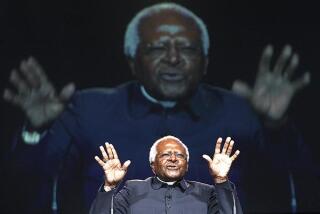Reagan Likely to Renew Expiring S. Africa Curbs : He May Also Designate Laxalt as Special Envoy to Pretoria, Officials Report; Tutu Assails Idea
- Share via
WASHINGTON — President Reagan, under pressure to take further action against the white-led government of South Africa, is likely to renew existing economic sanctions in early September and may also designate Sen. Paul Laxalt (R-Nev.) as a special envoy to Pretoria, officials said Sunday.
In response, South African Bishop Desmond Tutu said he will oppose the appointment of a special U.S. envoy unless the emissary goes to Pretoria demanding a number of concrete steps--including face-to-face negotiations between black leaders and white officials in South Africa.
“We’ve been getting too many special envoys,” Tutu declared on the NBC-TV program “Meet the Press.”
The idea of an envoy--originally put forth by Senate Republicans--is being considered as part of a wide-ranging policy reassessment by White House officials in the wake of the general outcry in Congress that followed Reagan’s speech last Tuesday in which he promised no new initiatives in the U.S. effort to bring an end to apartheid in South Africa.
Reagan Goals Explained
Assistant Secretary of State Chester A. Crocker, appearing on the CBS-TV program “Face the Nation,” said the President never intended to foreclose the possibility of additional steps. “He is not saying that he is opposed to all further actions that might be taken,” he said.
Continued Ban Likely
Crocker said there is “a very clear likelihood” that the Administration will renew the existing ban on the export of some goods when these measures expire on Sept. 9. Reagan imposed these sanctions a year ago, also in response to strong congressional pressure.
Sen. Richard G. Lugar (R-Ind.), chairman of the Senate Foreign Relations Committee, said the appointment of a special envoy is “under heavy consideration” at the White House. Other government sources identified Laxalt as one of several candidates for the job.
A longtime friend and confidant of the President, Laxalt previously served in the role of special envoy to Philippine President Ferdinand E. Marcos during the waning days of his regime. He is credited with helping persuade Marcos to step down.
Appearing on “Meet the Press,” Lugar endorsed as “very realistic” Tutu’s view that any U.S. special envoy to South Africa should insist upon an end to the current state of emergency, the withdrawal of troops from black townships, the freeing of political prisoners and an end to the ban on black political organizations.
Kennedy Ridicules Idea
But Sen. Edward M. Kennedy (D-Mass.), interviewed on the same program, ridiculed the idea of a special envoy. “I have very high regard for Sen. Laxalt, but quite frankly there is no further need for envoys,” he said.
Although it was understood that the envoy would be instructed to meet with prominent blacks such as African National Congress leader Oliver Tambo as well as white government officials, Sen. Orrin G. Hatch (R-Utah) reported that Tambo had recently refused an offer to meet with Secretary of State George P. Shultz. Crocker said he was unaware of any such refusal by Tambo.
Crocker, who will depart for London on Tuesday to consult with allied leaders on the South African situation, indicated that the President is delaying any further U.S. action against South Africa until British Prime Minister Margaret Thatcher decides what steps she will take.
“Clearly, the British have a great deal at stake,” he said. “They have more at stake than we do. They have more historical relationships down there.”
He said the President has written to South African President Pieter W. Botha in support of the current tour of southern Africa by British Foreign Secretary Geoffrey Howe, and he noted that the Commonwealth nations will discuss further action at their meeting in early August.
“We don’t want to cut directly across that,” Crocker said.
Black Envoy Considered
Crocker acknowledged that the Administration is still considering the appointment of Terence A. Todman, a black Foreign Service officer and current U.S. ambassador to Denmark, as the next ambassador to South Africa. Since Todman’s name surfaced late last week, he has come under attack from critics who question his commitment to human rights.
“He has a deplorable record of total insensitivity to human rights, and if his past is any indication, he will be far more sympathetic to the oppressor in Pretoria than to the victims of apartheid,” said Larry Birns, director of the Council on Hemispheric Affairs.
Lugar, whose committee will begin to draft sanctions legislation on Tuesday, said he expects Reagan to support at least some of the provisions that will be adopted by the Senate. He said the Senate bill will probably revoke U.S. landing rights for South African commercial flights, freeze South African bank assets in the United States, prohibit all new investment, restrict visas for South African officials and ban exports of U.S. goods to industries controlled by the South African government.
More to Read
Sign up for Essential California
The most important California stories and recommendations in your inbox every morning.
You may occasionally receive promotional content from the Los Angeles Times.










